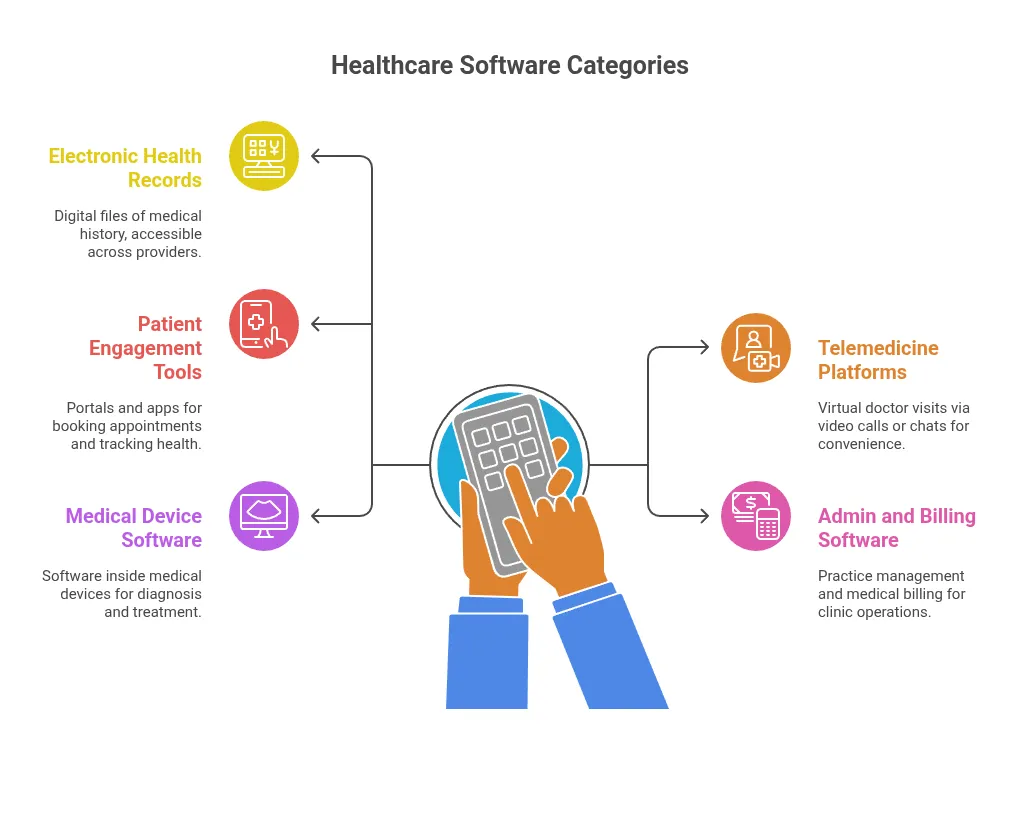Table of Contents
Ever wondered how technology keeps your healthcare running smoothly? Healthcare software is the answer—it’s changing how doctors, patients, and clinics operate every day.
From managing patient records to handling bills, different types of healthcare software make it all easier and faster. Let’s break it down and see what they do for you.
Overview of Healthcare Software Categories
Healthcare software isn’t just one thing—it’s a bunch of tools, each with a job to do. You’ve got systems for patient data, tools for virtual doctor visits, apps to keep you engaged in your health, and more. Think of it as a toolkit that helps everyone in healthcare stay on the same page.
The main types? Electronic records, telemedicine, patient engagement software, practice management software, medical billing software, and even software for medical devices.

Electronic Health Records (EHR) and EMR Systems
First up, EHR and EMR systems. These are digital files of your medical history—everything from allergies to prescriptions. EMRs stay within one doctor’s office, but EHRs? They travel, letting different providers peek at your info when needed. That’s a big deal if you switch doctors or need a specialist.
- Keeps your health history in one spot.
- Cuts down on lost paperwork or repeated tests.
- Example: Your doctor swiping through a tablet to check your last visit.
Telemedicine and Virtual Care Platforms
Telemedicine software is a game-changer. It’s how you talk to a doctor without leaving home—think video calls or chats. Great for quick check-ins or if you live far from a clinic. I tried it once for a follow-up, and honestly, it felt so easy—no driving, no waiting.
- Saves you time and travel.
- Helps people who can’t get out much, like in rural spots.
- Grew huge after 2020, and it’s not slowing down.
Patient Portals and Engagement Tools
Then there’s patient engagement software. Ever logged into a portal to see your test results? That’s it. These tools let you book appointments, message your doctor, or track your health with apps. It’s about putting you in the driver’s seat.
- Check lab results without a phone call.
- Reminds you to take meds or hit the gym.
- Example: MyChart—super handy for seeing what’s up with your care.
Admin and Billing Software Solutions
Now, the behind-the-scenes stuff—practice management software and medical billing software. Practice management keeps a clinic humming: scheduling, registering patients, that kind of thing. Medical billing software tracks the money, insurance claims, and payments, all sorted out.
- Less chaos for staff means more focus on you.
- Fewer mix-ups with bills or insurance headaches.
- Keeps the office running so your visit isn’t a mess.
Medical Device Software Examples
Medical device software is a bit different. It’s the brains inside things like X-ray machines or heart monitors. Or maybe an app that reads data from a wearable. This stuff helps doctors figure out what’s wrong and how to fix it.
- Speeds up diagnosis with sharper images or data.
- Example: Software that makes an MRI scan crystal clear for your doctor.
- Used in surgery too, guiding tools with precision.
Summary
So, what’s the takeaway? Healthcare software covers a lot:
- EHR and EMR keep your records straight.
- Telemedicine brings the doctor to your screen.
- Patient engagement software hands you the reins.
- Practice management and billing software tackle the admin grind.
- Medical device software powers the tools doctors rely on.
It’s all about making healthcare work better for you—less hassle, and more care. Technology’s moving fast, so who knows what’s next?
FAQs
What are the common types of healthcare software?
You’re looking at EHR and EMR systems, telemedicine platforms, patient engagement software, practice management software, medical billing software, and medical device software. Pretty much the core of modern healthcare tech.
Which healthcare apps are in demand?
People love telemedicine apps for convenience, plus health trackers and patient portals. Anything that makes managing your health simpler is hot right now.
What is the use of EMR, EHR, and telemedicine software?
EMRs lock your data in one practice. EHRs share it across providers for bigger-picture care. Telemedicine software? That’s your ticket to seeing a doctor remotely—perfect when you can’t make it in person.